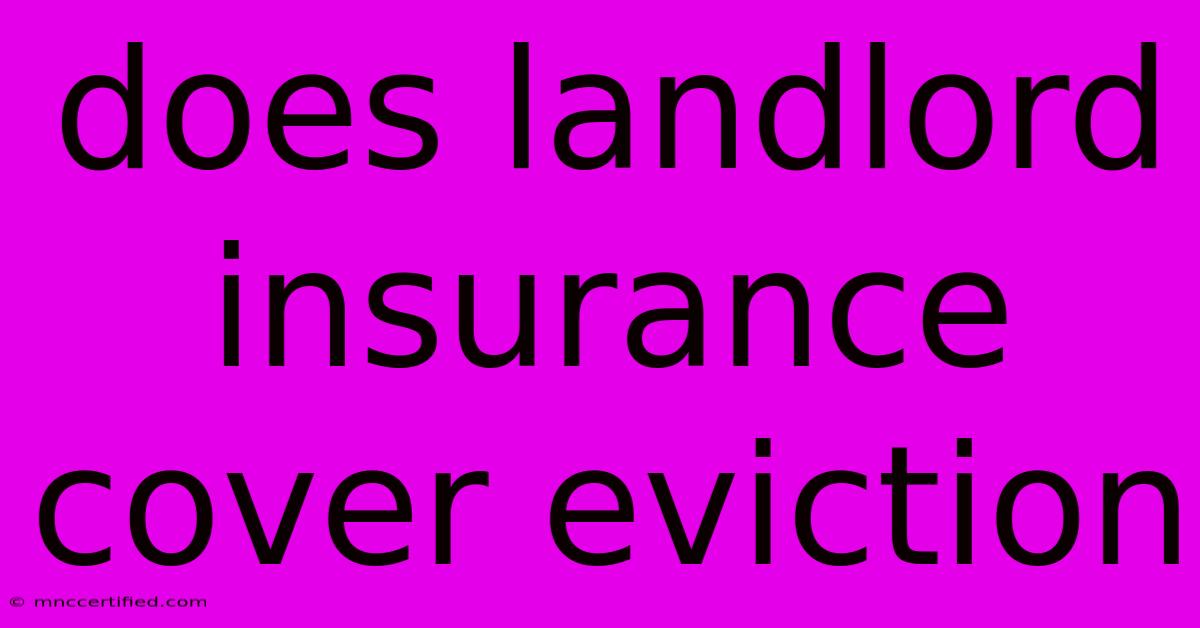Does Landlord Insurance Cover Eviction

Table of Contents
Does Landlord Insurance Cover Eviction? A Comprehensive Guide
As a landlord, you're responsible for managing your property and its tenants. This includes ensuring the property is well-maintained, collecting rent, and unfortunately, sometimes dealing with the complex process of evicting a tenant. You might be wondering, does landlord insurance cover eviction? The answer isn't a simple yes or no. Here's a breakdown of what you need to know:
Understanding Landlord Insurance
Landlord insurance, also known as rental property insurance, is designed to protect you against various financial risks associated with owning and renting out your property. It typically includes coverage for:
- Property damage: This covers damage to the building itself, like fire, water damage, vandalism, and more.
- Liability: Protects you from lawsuits filed by tenants or others who might be injured on your property.
- Loss of rent: Compensates you for lost income if your property is uninhabitable due to a covered event.
Eviction Coverage: The Grey Area
While landlord insurance typically doesn't directly cover the legal costs associated with eviction, it can provide indirect support. Here's how:
- Legal defense coverage: Some policies offer legal defense coverage, which might help cover attorney fees if you're sued by a tenant. While this doesn't cover eviction costs specifically, it can be beneficial if a tenant counter-sues due to the eviction process.
- Loss of rent: If a tenant is evicted, you may lose rental income until you find a new tenant. Landlord insurance policies that offer loss of rent coverage can help compensate you for this lost income.
What Landlord Insurance Doesn't Cover
It's crucial to understand that landlord insurance typically doesn't cover:
- The cost of hiring an eviction attorney: This expense is usually borne by the landlord.
- Court filing fees: These costs are often associated with the eviction process.
- Other legal costs: Expenses related to tenant disputes, lease violations, or other legal matters not directly covered by your policy.
Minimizing Eviction Risks
While landlord insurance can offer some protection, it's essential to minimize your risk of eviction in the first place. Here are some tips:
- Thorough tenant screening: Conduct a comprehensive background check, including credit history and criminal records.
- Clear lease agreement: Ensure your lease is clear and legally binding, outlining all the responsibilities and expectations of both parties.
- Effective communication: Communicate with tenants promptly and professionally to address issues before they escalate.
- Legal advice: Consult with a real estate attorney to understand your legal rights and obligations as a landlord.
In Conclusion:
While landlord insurance doesn't directly cover eviction costs, it can offer indirect support through legal defense and loss of rent coverage. It's essential to understand the limitations of your policy and take steps to mitigate the risk of eviction in the first place. By being proactive and responsible, you can navigate the complexities of renting out your property with greater confidence.

Thank you for visiting our website wich cover about Does Landlord Insurance Cover Eviction. We hope the information provided has been useful to you. Feel free to contact us if you have any questions or need further assistance. See you next time and dont miss to bookmark.
Featured Posts
-
Auxerre Predicted Xi Vs Marseille Loanee Starts
Nov 09, 2024
-
If I Hit A Pole Will My Insurance Go Up
Nov 09, 2024
-
Does Insurance Cover Milk Storage Bags
Nov 09, 2024
-
Rugbys Top Spot Boks In Three Way Contention
Nov 09, 2024
-
Bhad Bhabies Cancer Diagnosis A Look Back
Nov 09, 2024